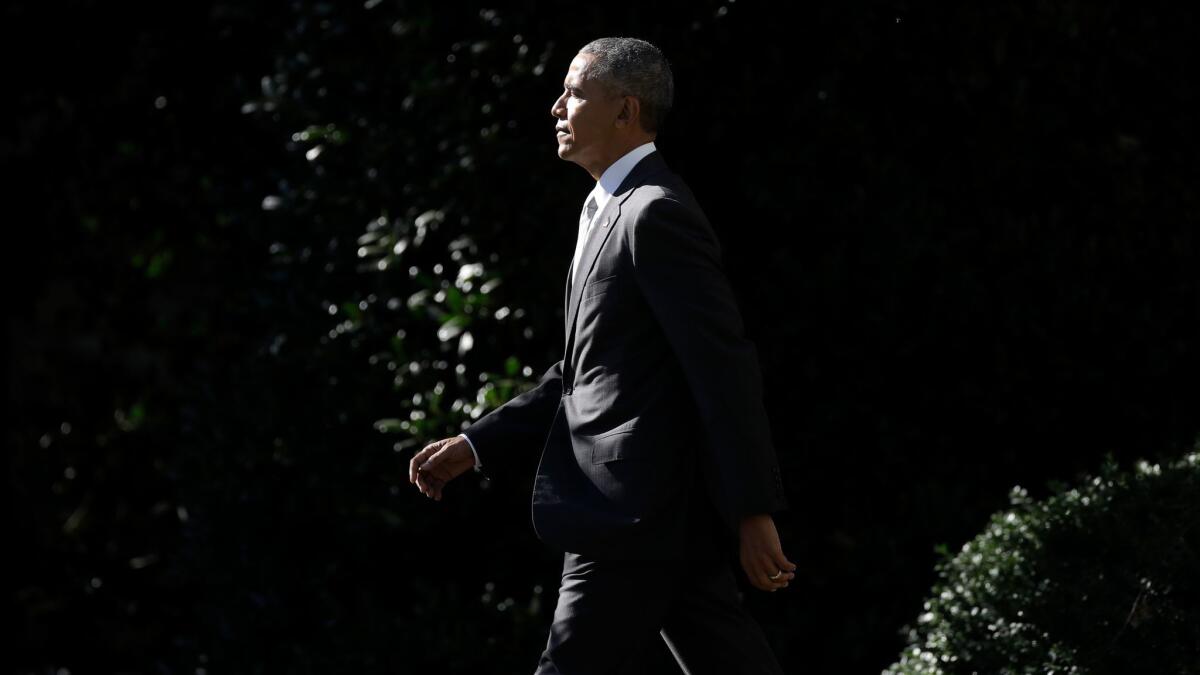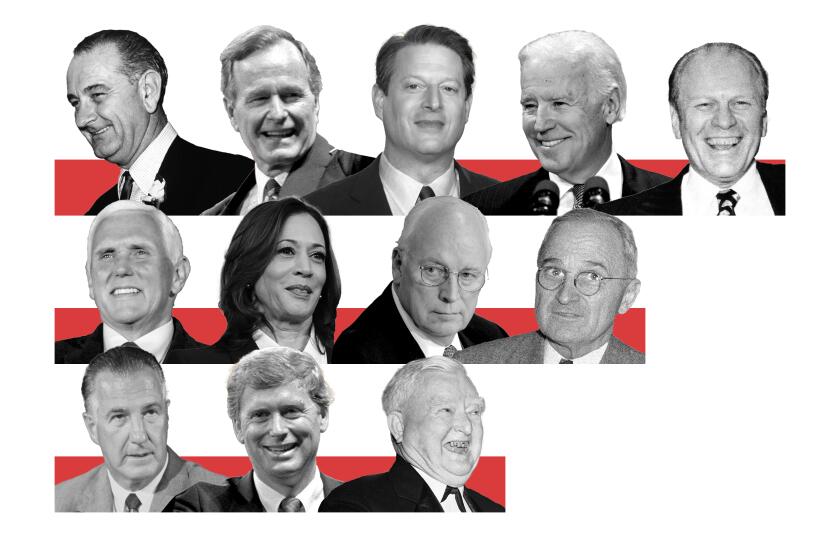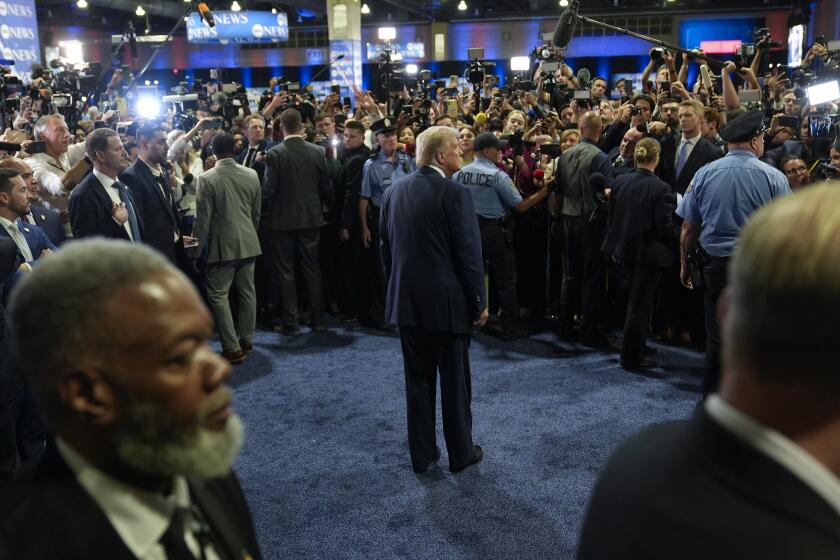Op-Ed: How Obama’s presidency provoked a white backlash — and rekindled a spirit of black resistance

President Barack Obama walks across the South Lawn of the White House on Oct. 28.
For more than three decades, Kerry James Marshall has been making ravishing paintings about the lives of black Americans, working out of a studio in Chicago’s South Side. The settings of his paintings are humble — housing-project gardens, kitchens, barbershops — but their scale, and the vision that informs them, are grand.
Marshall is the subject of a major retrospective at the Met Breuer, on the Upper East Side of Manhattan. The title of the show, “Mastry,” nicely captures the audacity of the artist’s hopes, his ambition to establish himself in a field dominated not only by white artists, but by an aesthetic regime whose notions of beauty, universality and, above all, mastery owe more than a little to a history of racial oppression. The black figures in Marshall’s paintings announce the exhilarating, almost shocking presence of something that, in most museums, has been felt mainly as an absence.
Walking through the exhibition last week, I found myself thinking of another black Chicagoan who has demonstrated “mastry” in an even more punishing and racially exclusionary line of work: the presidency. The pride, style and almost miraculous composure of Marshall’s canvases all find echoes in President Obama’s leadership.
As it turned out, the Obama era supplied only one racial miracle: his election.
“When they go low, we go high,” Michelle Obama said at the Democratic National Convention. In the face of a horrifying racist backlash to his very presence in the White House, he has gone as high as an elected official could go.
Obama’s Swahili first name, which is derived from the Arabic baraka, or spiritual wisdom, means “he who is blessed.” Many of us felt, or hoped, that he was endowed with baraka when he was first elected.
He had inherited the catastrophic wars that his predecessor had launched in the Middle East, and just before he entered office, came the financial crisis. But the hope that Obama’s presidency would be (as he himself put it) “transformative” also reflected an older longing that he might help the country to overcome its racial divide and become genuinely united.
Hand in hand, we would follow him to the “post-racial” Promised Land, as if he were one of those “magical Negro” characters in Hollywood films who devote their lives to solving their white friends’ problems. There was always something a bit kitsch about this dream, which was mainly expressed by whites; for obvious reasons, black Americans tend to have a far more sober view of the country’s ability to address, much less transcend, its racial divisions.
As it turned out, the Obama era would supply only one racial miracle: his election. Determined not to be seen as the “president of black America,” he studiously avoided the subject of race; when forced to address it, he succumbed to banalities about the need for a “national conversation.” Faced with the deepening crisis in black America — police killings of unarmed civilians, including children; the epidemic of mass incarceration; economic and political disenfranchisement — Obama seemed unwilling, or unable, to respond with the sense of urgency that once had led him to become a housing organizer in Chicago.
As late as July 2014, Harvard law professor Randall Kennedy wrote that for many black Americans, “the thrill is gone.”
In the last two years, however, Obama has finally assumed his historic role with moral seriousness, in part, one suspects, because he accepted the fact that his presidency would not be transformative, and that he could, at best, be a bulwark against the racist furies that it unleashed; a civilized counterpoint to the vengeful white noise of the red states. As Régis Debray famously argued, “Revolution revolutionizes the counter-revolution.” And so it has been with the racial counter-revolution in America, a know-nothing white nativism that has found its führer in Donald Trump.
Many have noted that this movement, which has attracted the support of a sizable minority of white Americans, targets not only black people, but immigrants, Mexicans, Muslims and, most recently, shadowy bankers reminiscent of “The Protocols of the Elders of Zion.” But anti-black animus is the lava at its incendiary core.
What leads many white Americans to believe the canard that Obama was not born in America — a claim Trump has done more than anyone to promote — is not merely the fact that his father was Kenyan. It is the notion, as old as slavery itself, that black people will always be unassimilable outsiders, and that if they don’t “know their place,” whether as slaves or subalterns, they ought to “go back to where they came from.” Abraham Lincoln himself flirted with the idea that, once freed, blacks should be resettled in Africa and the Caribbean.
Of course, not only is Obama an American, but black Americans have deeper roots in this country than anyone aside from Native Americans: The White House itself was built by slave labor. The black contribution to American culture and civilization has been staggering — from music and food to athletics, humor, literature, even the idea of freedom itself — yet this fact encounters as much resistance in certain quarters as the vast Jewish contribution to German culture did early in the previous century.
For Trump’s followers, “making America great again” means making it white again. Amid the financial crisis, it has become increasingly difficult for cash-strapped whites to acknowledge what they owe to blacks because to do so would leave them feeling spiritually bereft. As their numbers have declined and their living conditions have become harder to distinguish from those of blacks, they have insisted on their racial privilege all the more stubbornly: hence the rise of Trump, with his undisguised appeal to ressentiment.
In black America, the Obama presidency and the backlash it provoked have rekindled a spirit of resistance not seen since the era of Black Power, both in politics — with the rise of Black Lives Matter — and in culture, with the emergence of such figures as Ta-Nehisi Coates, poet Claudia Rankine, rapper Kendrick Lamar and filmmakers Ava DuVernay and Barry Jenkins. This renaissance is steeped in a sense of history, something the Trump movement pointedly disavows. It also is alive to the overlapping nature of oppression, or “inter-sectionality”: Many of the leaders of Black Lives Matter are from the LGBT community.
That this culture of protest has arisen during the Obama era is no accident, and to see it flourish is to savor the sweetness of his triumphs, however thwarted they have been. Only one other American president — Thomas Jefferson — had a black family, and he was a slaveholder, so let us not underestimate the distance traveled. Yet Obama is also, in the best sense, Jefferson’s heir: a cosmopolitan intellectual and writer, a profoundly introspective man who has lived by his command, his “mastry,” of the word.
Adam Shatz is a contributing editor at the London Review of Books and a scholar in residence at the New York Institute for the Humanities.
Follow the Opinion section on Twitter @latimesopinion or Facebook
MORE FROM OPINION
Conservatives shouldn’t trust Trump with their votes, or the Constitution
More to Read
A cure for the common opinion
Get thought-provoking perspectives with our weekly newsletter.
You may occasionally receive promotional content from the Los Angeles Times.










